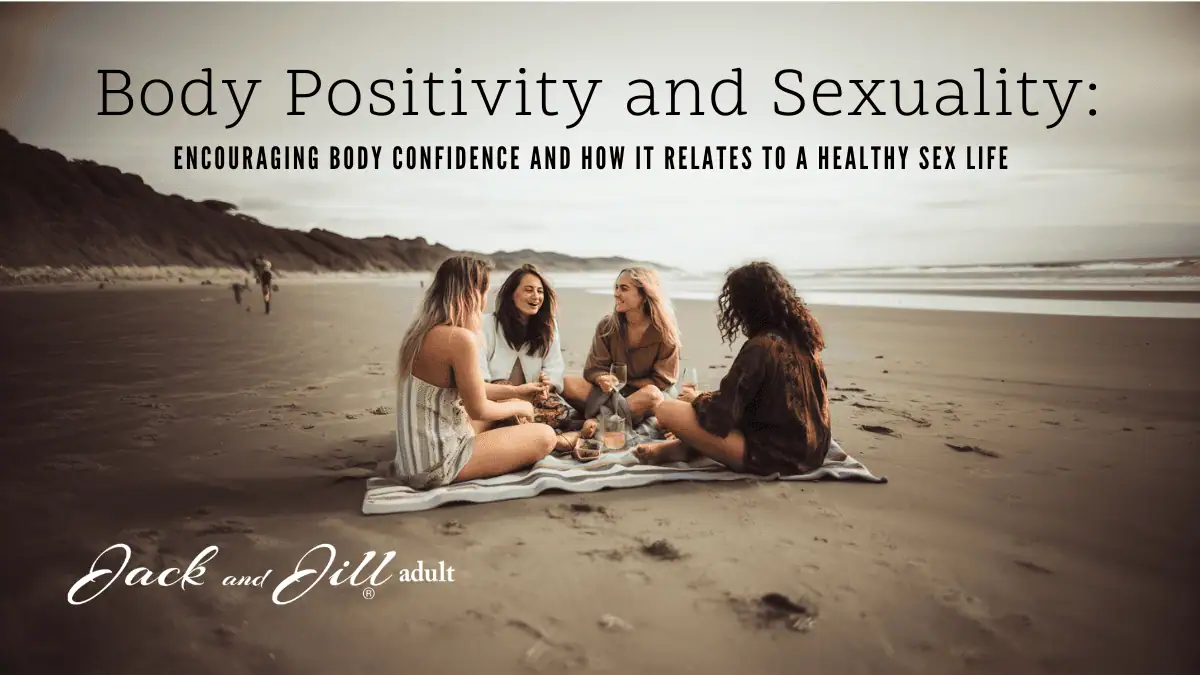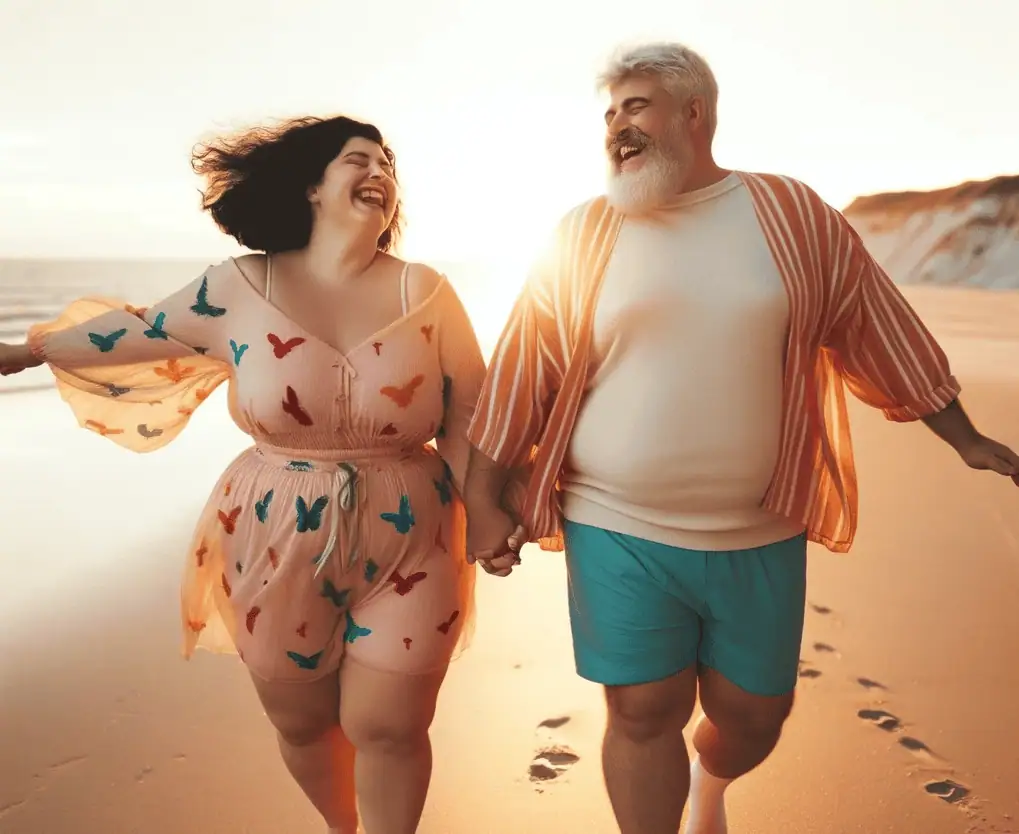
Body Positivity and Sexuality: Encouraging Body Confidence and How It Relates to a Healthy Sex Life
Beyond societal beauty standards lies a potent truth: body positivity can revolutionize our sex lives. This article addresses body positivity and sexuality, encouraging body confidence and how it relates to a healthy sex life,” paving the way to a healthy and more satisfying sex life. Dive in as we examine the crucial link between embracing every curve and enjoying fulfilling sexual encounters without leaving behind the essence of what makes us unique.
Key Takeaways
- Body positivity promotes self-acceptance and the appreciation of all body types, contributing to sexual self-confidence and yielding more satisfying sexual experiences.
- Negative body image can negatively impact sexual function and experiences, while strategies for combatting such negative self-perception, like sexual mindfulness and positive affirmations, can improve sexual well-being.
- Real-life stories underscore the transformative effect of body positivity on sexual lives, highlighting the importance of celebrating body diversity and challenging societal beauty standards.
Understanding Body Positivity and Its Impact on Sexuality

Body positivity is more than a buzzword; it is a movement that promotes the acceptance and appreciation of all body types. This concept encourages people to embrace their bodies, no matter their shape or size, and look beyond societal standards’ often narrow beauty definitions. Media resources, including podcasts, books, and TV shows, have played an influential role in promoting diverse perspectives on body positivity.
Adopting body positivity is a process that entails fostering confidence and cultivating self-love. This journey leads to enhanced overall well-being and can significantly improve our sexual experiences. Studies indicate that positive body self-perception can result in more satisfying sexual encounters, consequently boosting sexual self-confidence. This means that the more we appreciate our bodies, the more satisfied we are likely to be with our sexual experiences.
Defining Body Positivity
What does body positivity precisely entail? Fundamentally, body positivity involves cherishing one’s body, notwithstanding its perceived flaws. It advocates for confidence, self-love, and acceptance of one’s shape and size. This movement finds its roots in the fat acceptance movement of the late 1960s, which aimed to combat fat-shaming and discrimination.
Over time, body positivity has evolved, widely promoting the message that ‘all bodies are beautiful.’ It gained momentum through platforms like Instagram and inclusive marketing campaigns. Affiliated movements like Health At Every Size (HAES) have further bolstered body positivity, advocating for respect and a more inclusive view of health that embraces the diversity of all body types.
The Connection Between Body Confidence and Sexual Well-being
Studies have demonstrated a connection between a positive body image and enhanced sexual satisfaction. On the other hand, men and women who have concerns about their body image often report negative sexual experiences. Research linking body image to sexual satisfaction shows that positive sexual experiences can increase feelings of attractiveness and desirability, reinforcing body positivity. In contrast, individuals with greater body satisfaction often report more fulfilling sexual experiences.
Negative perceptions of one’s body can profoundly impact sexual function. This can lead to decreased desire and arousal, as well as difficulties with orgasm, often disrupting the sexual experience. Studies have shown that women satisfied with their body image tend to have higher sexual function and are more likely to initiate sexual activity. This underpins the connection between body image satisfaction and sexual well-being.
Overcoming Negative Body Image
Negative body image, characterized by dissatisfaction and excessive concern about one’s physical appearance, can severely impact sexual confidence. What strategies can we employ to combat negative body image and poor body image? The first step is identifying negative messages from sources such as media, family, and past experiences.
Acknowledging the desirability of all bodies and the broad range of attractive body types can improve sexual confidence. This can help combat negative thoughts about physical appearance.
Letting go of internalized biases, self-criticism, and sexual shame through sexual mindfulness contributes to more fulfilling sexual experiences and is a crucial part of overcoming negative body image.
The Role of Self-Acceptance in Sexual Relationships

Self-acceptance significantly influences our sexual relationships. Individuals who accept themselves are more likely to have a positive sexual self-concept. This leads to more satisfying sexual experiences and an improved quality of sex life. Self-acceptance allows individuals to feel more comfortable with their own bodies. This enhances intimacy and sexual pleasure with their partner.
Self-acceptance also promotes authenticity and a genuine connection between partners, which is a key contributor to overall relationship satisfaction. Research shows that body appreciation is linked with more liberal, sex-positive attitudes. This can lead to more positive sexual experiences and enhanced sexual satisfaction.
Embracing Individuality
Acceptance of individuality within sexual activities can pave the way for a more satisfying sex life. As partners learn to appreciate their unique physical and emotional characteristics, they enhance their personal connection and overall sexual satisfaction. Celebrating one’s individuality can reduce performance anxiety and body-related insecurities during sex. This leads to a more relaxed and spontaneous sexual encounter.
A woman’s perception of her partner’s perceived opinion of her body was a strong predictor of body appearance and cognitive distraction during sexual activity. This suggests the importance of partner perceptions in sexual desire and functioning. Furthermore, body appreciation is associated with more positive mental health, reducing symptoms of anxiety and depression that can impact sexual functioning.
Communication and Vulnerability
Open communication and vulnerability are key elements in sexual relationships. Being vulnerable to personal insecurities related to the body can foster a deeper sense of intimacy and connection between sexual partners. Open communication about body insecurities can help partners to better understand and support each other. This deepens the trust within the relationship.
Vulnerability in sexual relationships, when met with empathy and support, can deepen trust and improve the overall quality of the sexual connection. Sharing a sexual fantasy or writing a sexy story with a partner can be a pathway to connect on a deeper level and explore desires while avoiding risky sexual behavior. This leads to greater sexual confidence and fulfillment.
Embracing individuality in sexual relationships encourages self-awareness and personal growth, enhancing emotional and physical intimacy.
Positive Affirmations and Their Effects
Positive affirmations hold the potential to alter negative thought patterns about one’s body significantly. This leads to more liberated and enjoyable sexual experiences. The use of positive affirmations can reduce sexual anxiety and stress, contributing to a more positive sexual self-view and healthier sexual interactions.
Regular use of positive affirmations related to body image and self-worth can improve sexual confidence and alleviate performance pressure. Positive affirmations can help individuals cultivate a more positive body image and self-esteem. This can then translate into a more confident and enjoyable sexual experience. Some examples of positive affirmations related to body image and self-worth include:
- “I am beautiful and deserving of pleasure.”
- “I embrace and love my body as it is.”
- “I am confident and comfortable in my own skin.”
- “I deserve to feel pleasure and enjoy my sexuality.”
Challenging the belief that one must conform to a particular body size or shape to be sexually desirable, positive affirmations remind individuals that all are worthy of sex, pleasure, and attention.
Positive affirmations during sex, such as replacing negative thoughts with empowering statements, can enhance the sexual experience by promoting body confidence.
Navigating Body Image Issues Within Sexual Dynamics
Issues with body image can have a direct impact on sexual dynamics. Body shame can diminish sexual pleasure due to persistent self-critical thoughts during sexual activity. Individuals who experience body shame may develop tendencies to avoid sexual encounters to prevent exposure or judgment of their bodies.
Body shame can also be a barrier to establishing intimate relationships, as it often cultivates fear of intimacy and vulnerability. Therefore, it is important to navigate these issues effectively to maintain a healthy sexual relationship. This involves addressing body shame, societal expectations, and the influence of media.
Dealing With Body Shame
Coping with body shame necessitates recognizing and delving into one’s feelings. This can include journaling or therapy to understand and heal from underlying causes such as childhood trauma, religious or cultural beliefs, or inadequate sex education. Positive reinforcement from supportive partners, empathetic communities on social media, and professionals, such as sex therapists, can help overcome physical insecurities and build sexual confidence.
Coping strategies for dealing with body dissatisfaction include:
- Focusing on personal strengths
- Practicing self-care
- Challenging negative thoughts
- Being part of supportive social contexts that promote body appreciation
Body self-consciousness, particularly during intimacy, is a significant predictor of arousal and orgasm problems. Negatively evaluating one’s body, muscularity, body fat, and genitals can lead to heightened self-consciousness, which adversely affects sexual satisfaction and functioning.
Breaking Free from Societal Expectations
It’s essential to challenge societal beauty and sexual attractiveness norms to foster body confidence and amplify sexual pleasure. Jameela Jamil, an advocate for body positivity, encourages individuals to shift towards body liberation or neutrality, finding self-worth beyond their physical appearance.
Beauty standards are far from uniform; they vary significantly between cultures and through personal experiences, media, and societal norms. Broadening the narrow, often Eurocentric beauty ideals is essential for appreciating the diverse forms of beauty that include:
- different cultures
- ethnicities
- abilities
- gender identities
The Influence of Media on Sexual Self-Image
Social media platforms frequently propagate unrealistic beauty ideals and foster unhealthy comparisons, leading to body dissatisfaction and diminished self-esteem among users. The emergence of ‘Snapchat dysmorphia’ indicates a worrying trend where individuals seek cosmetic procedures to resemble their digitally altered photos. Cyberbullying based on body size, shape, or appearance on social media platforms can damage individuals’ body image and self-esteem. Some potential negative effects of social media on body image and self-esteem include:
- Increased body dissatisfaction
- Comparison with unrealistic beauty standards
- Seeking cosmetic procedures to resemble digitally altered photos
- Cyberbullying based on body size, shape, or appearance
It is important to be aware of these potential negative effects and take steps to protect your mental health while using social media.
For those with body-image disorders, such as body dysmorphic disorder (BDD), social media can exacerbate symptoms due to constant exposure to curated and edited images. Exposure to images of ideal bodies has been linked to increased body dissatisfaction among males, reflecting the broad impact of media on body image. To foster a more positive self-image, individuals can curate their social media feeds to include bodies similar to their own and people who are embracing their physical appearance. Avoiding accounts and images that trigger negative body image perceptions is a recommended strategy for individuals seeking to improve their self-image.
Being mindful of social media’s impact and engaging in positive activities can shift focus away from negative perceptions of one’s body. There is an increasing representation of diverse body types in social and mainstream media, leading to broader conversations about weight, size, and body-type inclusivity. By recognizing the pervasive influence of media portrayals on body image and sexual expectations, individuals can take proactive steps to build and maintain a healthier self-perspective.
Promoting Healthy Sexuality Through Body Positivity

Maintaining a positive body image is key to a fulfilling sexual experience. Interventions aimed at improving body image in women could have beneficial outcomes on their sexual experiences, underscoring the need to address body image for better sexual health.
Awareness and understanding of sexual health are important for adding enjoyment and fulfillment to one’s sexual life, reducing stress, and enhancing intimacy between partners.
Physical Activity and Sexual Health
Consistent physical activity can boost sex drive and libido in both genders. Weight training and cardiovascular exercises can increase testosterone by 15% in middle-aged men, which correlates with an improvement in sexual desire and function.
A 20-minute exercise session can boost sexual arousal in women by 169% due to increased genital blood flow. Exercise helps maintain hormone balance by controlling insulin levels, thereby positively affecting libido.
Improving cardiovascular health through exercise has several benefits for sexual well-being, including:
- Managing erectile dysfunction in men
- Enhancing arousal times in women
- Promoting positive body appreciation, which is linked to healthier lifestyle choices and a stronger motivation to engage in physical activity
Mindfulness Practices for Sexual Pleasure
Sexual mindfulness entails purposeful attention to intimate experiences devoid of judgment, maintaining a presence at the moment, and practicing kindness and non-judgment towards oneself and their partner. Mindfulness interventions can reduce sexual distress, enhance sexual experience by decreasing body-related cognitive distraction, increase sexual satisfaction, and improve sexual function and mood when practiced regularly.
Fostering sexual mindfulness can be achieved by:
- Focusing on pleasurable sensations
- Creating a distraction-free environment
- Syncing breathing with a partner
- Making eye contact
- Practicing gratitude
- Releasing expectations during sex
Engaging in activities that promote a sense of inhabiting the body, such as dance, physical activity, or spending time in nature, can increase body appreciation and empower sexual experiences.
Celebrating Diversity in Human Sexuality
Critiques of the mainstream body positivity movement have pointed out its predominant focus on white cis women, emphasizing the necessity for inclusivity that encompasses queer, trans, Black individuals, and people of color. Body size diversity is crucial in inclusion discussions and vital for fully recognizing each individual’s uniqueness.
Heightened body appreciation is correlated with healthier eating habits and a reduced risk for symptoms of eating disorders, which can otherwise lead to sexual dysfunction. Social media content that emphasizes body positivity has been instrumental in promoting self-love and acceptance of diverse body types, contributing to heightened body satisfaction.
Factors to consider in discussions surrounding the sexual health of individuals with diverse gender identities include:
- Reproductive health
- Fertility
- Pregnancy
- STI testing
- Hormones
- Treatments related to sexual transition
Empowering Sexual Experiences with Body Appreciation

Appreciation of one’s body can greatly enhance sexual experiences. Exploring one’s own body through self-touch leads to a better understanding of what feels pleasurable, enhancing sexual confidence and enjoyment.
Body Image Play and Exploration
Body image plays and exploration can involve using mirrors during intimacy to increase comfort with one’s body and enhance sexual experiences. Sensual self-massage is a method of body exploration that can promote relaxation and self-appreciation, contributing to a positive body image.
The use of mirrors can reflect real-time feedback during intimate moments, allowing individuals to confront and accept their body image. This may enhance the feeling of sexual empowerment.
Kegel exercises, which strengthen pelvic muscles, can lead to improved erections for men and better orgasms for women. This heightens sexual pleasure through physical exploration.
The Power of Positive Sexual Experiences
The significant impact of positive sexual experiences is undeniable. The release of neurotransmitters like oxytocin and dopamine during sexual activity fosters feelings of attachment, trust, and contentment. Inducing feelings of pleasure and relaxation, engaging in sexual activity prompts the release of endorphins, the body’s natural stress relievers.
Sexual activity mediated by these neurotransmitters contributes to a robust sense of mental well-being, which can reinforce body appreciation. Exploring personal desires within the bounds of consent and mutual respect leads to personal growth, self-discovery, and a sense of authenticity and self-awareness. Studies suggest that greater body appreciation provides a strong foundation for positive behaviors and attitudes, which includes more positive sexual experiences.
Addressing Disordered Eating and Sexual Dysfunction
It’s essential to address disordered eating and sexual dysfunction to maintain a healthy sex life. Difficulties in sexual functioning, such as loss of libido and sexual anxiety, are often reported by women with eating disorders. These are more prevalent across different eating disorder subtypes, particularly among those with a lower body mass index.
In women with eating disorders, psychological factors like trait anxiety, ineffectiveness, and harm avoidance are consistently associated with sexual dysfunction. Recovery from eating disorders can lead to significant improvements in sexual functioning, which underscores the importance of integrating sexual health into the treatment framework.
Men tend to experience ‘atypical’ eating disorders and associated substance abuse. They are more reserved about their body dissatisfaction and are proportionally less likely to seek treatment. Recognizing the systemic nature of eating disorders and body image issues is crucial. These challenges are complex, and acknowledging them can alleviate feelings of self-blame in affected individuals.
Gender Differences and Sexual Expression
Understanding the differences in sexual expression across genders is critical to comprehend body confidence and sexual behaviors. Research indicates that men and women differ in their handling of body image. Women typically internalize body issues more, experiencing greater body shame and engaging in more body surveillance. Men may not exhibit body-change behaviors to the same extent but experience challenges in feeling either too thin or too heavy.
Male body image disorders are particularly severe among gay and heterosexual teenagers through to young adults, highlighting the struggles specific age demographics face in dealing with body dissatisfaction. Sexual orientation did not significantly alter the associations between body image and sexual health outcomes. However, genital image evaluation revealed complex relationships with sexual behavior, demonstrating a lower likelihood of abstaining from sex and yet correlating with a fewer number of sexual partners.
The consistency across genders in the relationship between body image and sexual health practices, as well as their impact on physical health, suggests that while experiences of body image dissatisfaction can differ between men and women, the overall impact on sexual health behaviors is similar for both genders.
Women’s Body Image and Sexual Behaviors
Societal expectations and personal experiences significantly influence women’s body image and sexual behaviors. Women are more likely to experience body dissatisfaction in social situations that emphasize physical appearance.
Man’s Relationship with Body Confidence
Societal expectations also affect men’s relationship with body confidence. A large proportion of men, specifically 95% of college-age men, experience some level of dissatisfaction with their bodies, highlighting the pervasive issue of male body image concerns.
Non-Binary Perspectives on Body Positivity and Sexuality
From a non-binary perspective, body positivity and sexuality underscore the importance of asserting one’s existence and beauty beyond the conventional gender binary norms. Critiques of the mainstream body positivity movement have pointed out its predominant focus on white cis women, emphasizing the necessity for inclusivity that encompasses queer, trans, Black individuals, and people of color.
Non-binary and gender non-conforming individuals like Alok often face violence and harassment for their visible gender expression, affecting their relationship with their own bodies. Alok Vaid-Menon, a gender non-conforming artist and writer, challenges binary gender norms through body positivity by embracing their chest hair as a symbol of beauty and defiance against societal norms.
Real Stories: Body Positivity Transforming Sexual Lives
Real-life accounts of how body positivity transforms sexual lives serve as strong evidence of the impact of embracing this concept. Rachel Raven, an escort aware of societal beauty standards, found her perspective on what constitutes ‘sexy’ broadened through her experiences in sex work. Despite adhering to conventional beauty standards in her early twenties, Rachel’s professional encounters led to newfound self-awareness and appreciation for her own allure.
Rachel’s journey into body positivity was further enriched by her clientele, which included individuals not typically considered attractive by social standards. This challenged her and reshaped her notion of beauty. These experiences culminated in a transformation that had a profound impact on Rachel’s sexual well-being.
This mirrors the transformative power of body positivity on sexual lives.
Summary
To sum up, body positivity plays a significant role in our sexual health and satisfaction. By embracing body positivity, we can enhance our sexual experiences and improve our body confidence and sexual well-being. It is important to challenge societal beauty standards and embrace the diversity in human sexuality.
Practicing sexual mindfulness, engaging in physical activity, and fostering body appreciation can promote healthy sexuality. Addressing body image issues such as body shame, disordered eating, and sexual dysfunction can lead to a healthier and more fulfilling sex life. Let’s continue to advocate for body positivity and sexual wellness, celebrating our bodies in all their unique beauty and strength.
Frequently Asked Questions
How does sex improve mental health?
Sex improves mental health by naturally releasing endorphins, which boost mood and happiness levels, helping to maintain emotional health. Therefore, it is important to prioritize good sexual health year-round.
How does lifestyle affect sexuality?
Maintaining a healthy lifestyle through good dietary choices, regular exercise, and avoiding smoking, alcohol, and drug use can help maintain libido, reduce the risk of erectile dysfunction, and lower the chance of developing sexually transmitted infections.
How does body image challenge the development of a healthy sexuality for people?
Negative feelings about one’s appearance can lead to increased sexual anxiety and lower sexual esteem in women, affecting their development of a healthy sexuality. This represents a significant challenge that can impact an individual’s well-being.
What is body positivity during sex?
Body positivity during sex is about uplifting and celebrating ourselves and our bodies while freely seeking pleasure in whatever form that may come. It aims to promote healthy and consensual sexual activities and challenge societal taboos.
How does body positivity affect sexual health?
Body positivity has a positive impact on sexual health, as it is linked to greater sexual satisfaction and can improve sexual functioning.

